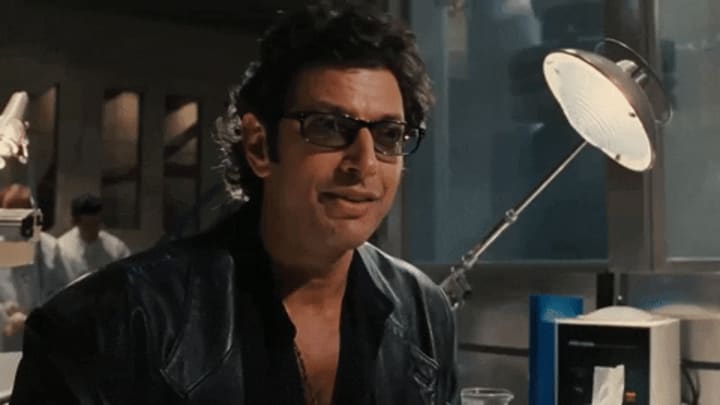Dinosaurs: The Earth's GOAT
Sorry, Humans, You're Not Even a Blip

The Stegosaurus lived longer before the Tyrannosaurus Rex than the T-Rex lived before us.
Think about the implications of that for a minute. Stegosaurus roamed the earth around 150 million years ago in the late Jurassic period. That was already the second geologic period of the dinosaurs. (The Triassic kicked off 100 million years before ol' Stegs popped up). T-Rex didn't appear until the end of the Cretaceous period 85 million years later. And then us homo sapiens, the planet's snot-nosed Gen-Zers, rolled in less than three hundred thousand years ago, 65 million years after the final episode of Dinosaurs. Even including Neanderthals and other hominids only gets us about half a million years closer. If you go with the broadest possible definition and say mammals, our species has only been on top since well after the dinosaurs got meteored.
Dinosaur domination of Earth as a species stretched across 200 million years. It took the meteor that made the Gulf of Mexico to stop them. Homo sapiens? Right now we're at .15% as long. If dinosaurs had lived for one 24-hour period, we're at - let me see here - just over two minutes. Even comparing our three hundred millenia run to an individual dinosaur type, most of them clock in at multiple millions of years, so we're still just starting out.

The history of the dinosaurs is bordered on both ends by disaster. The Permian Extinction, which wiped out almost 95% of life on the planet, ushered in the age of the dinosaurs. And nothing knocked them off that pedestal until another Extinction Event ended their reign. (A baby one by comparison; it only killed half the species at the time.) The dinosaurs were so successful that it took a planetary catastrophe to take them out.
Dinosaurs were wonderfully diverse. There were carnivorous, omnivorous and herbivorous ones. They could have bony heads and spikes and horns, or long necks, giant fans, back plates and razor-sharp claws. Some were tiny, feathery insect hunters and some were behemoths over 100 feet long and weighing 70 tons. So with all this diversity, we have a question seldom asked, but difficult to answer: What makes a dinosaur, a dinosaur?
They shared some features, like all laid eggs and all the toothed ones kept growing teeth throughout their lives. But the main characteristic that made dinosaurs different was their hips. As opposed to lizards like alligators, whose legs are splayed to the side, dinosaurs have their legs upright, pillar-like under their bodies, allowing them to stand straight.

These characteristics will immediately identify many creatures that popular culture (I'm looking at you, Jurassic Park) identifies as dinosaurs, but aren't. Pterodactyl? Sorry. Megalodon? Nope. Even my personal favorite Helicoprion wasn't really a "dinosaur." (Though I still call it one; I'm not going to tell a kid whose favorite dinosaur is a sea shark with a buzzsaw for a mouth "Sorry, kid, not a dinosaur!")
You may also notice similarities to modern-day creatures that are the only surviving dinosaur ancestors: birds. Many dinosaurs had hollow bones, and lungs that breathed like birds ,which use less energy due to not needing a diaphragm. That helped them grow to such mammoth sizes and sustain their bulk. Their scales and skin resembled what you see on bird legs and bodies. Fossil evidence proves many had feathers, and new scientific techniques can even determine color. The modern ancestor of the dinosaur is the chicken, and dinosaurs survive in our dominate era the same way mammals did in theirs: by being small and getting out of the way.

After reading this, you can't help but be upset with the Jurassic Park movie. Its dinosaurs had no feathers, and dinosaurs millions of years apart ran side by side. They spliced frog DNA, rather than chicken or other more appropriate creatures, to fill in dino DNA gaps. Plus velociraptors were the size of particularly vicious housecats; what we saw was a deinonychus, but that name just doesn't sound as awesome. And one of the most endearing scenes, Dr. Grant feeling a triceratops breathe, simply wasn't a reality with how dinosaurs functioned.
In many ways, the movie was a victim of its own success. The Jurassic Park effect was real, inspiring a huge wave of new paleontologists. Many of the discoveries above have been made in the last twenty years, in part because new minds and new ideas are working on the dino debate. All thanks to one movie. I wouldn't be too hard on it.

But why were the dinosaurs the dominant species on Earth for such a ridiculously long time? It's due to all their evolved innovations that gave them the edge to utterly rule the planet for two hundred million years. First, they bred and grew to maturity far faster than any of their competitors. In very short order the multiple egg-laying, fast-growing dinosaurs outnumbered and overpowered species with slower gestation and life cycles.
Second, their wide range of sizes and diets allowed them not to compete with each other for food and territory, but live in concert. Small herbivores ate the plants literally beneath the notice of their larger and taller brethren, and the variety of carnivores ate the appropriate herbivores for their size, speed and weaponry. Plus they could eat the other species like the mammals and amphibians (and eat their food as well) who struggled to cling to existence among all these terrible lizards.

Dinosaurs were by any measure the greatest and most dominant species the world has ever known. Think about that next time you call someone a dinosaur, because you're not calling them old and slow.
Or the next time you call someone a chicken.
Note: I would highly recommend the book A Grown-Up Guide to Dinosaurs by Ben Garrod for additional reading. And you don't need to be an adult to enjoy it.
About the Creator
William Reid
Speculative fiction, fantasy and horror writer who also loves traveling, reading, cooking and taking care of his two kids. He grew up in Idaho and now writes of places as far away from his roots as possible from his home base in Seattle.






Comments
There are no comments for this story
Be the first to respond and start the conversation.